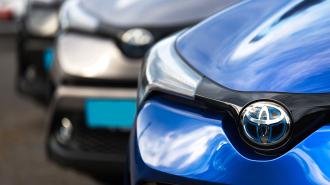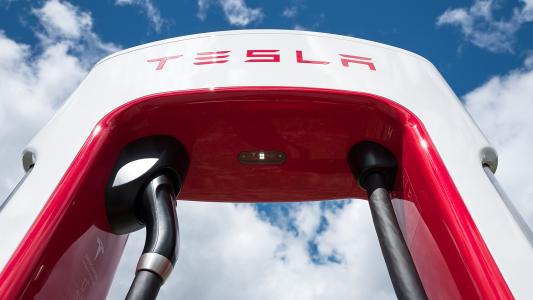Toyota has big plans to bring new, improved tech — and, perhaps, a sharper focus — to the electric vehicle market. It suggests a shift from the auto juggernaut’s previous position, which took a more skeptical approach to converting to fully EVs, instead pursuing a mix of fully-electric, hybrid, and hydrogen cars.
The maker of the Prius, the world’s first mass-produced hybrid, says it will continue to offer a range of powertrain options, but it also announced a suite of new technologies designed to help the company fully join the fight for the EV market. This includes AI-assisted aerodynamic design, “Gigacasting” manufacturing like the kind used by Tesla, and — most crucially — “next-gen” EV batteries.
Toyota claims it will soon crank out EVs capable of going over 600 miles on one charge by 2026 — double the average range of new EVs hitting the road today. By 2028, the company’s aim is over 900 miles, per InsideEVs.
“That is stunning,” Michelle Krebs, an executive analyst at Cox Automotive, told Axios. (Cox Automotive and Axios are owned by the same parent company.)
Concern over driving range is one of the three biggest barriers preventing people on the fence from going fully electric, Krebs noted.
Toyota has announced a suite of new technologies designed to help the company fully join the fight for the EV market, including AI-assisted aerodynamic design, “Gigacasting” manufacturing, and — most crucially — “next-gen” EV batteries.
New battery tech: First on Toyota’s innovation docket is an optimized version of the lithium-ion battery that currently dominates the electric car market, InsideEVs reported. The 600-mile per charge battery will power a new model from Lexus, the luxury brand owned by Toyota.
Two new bipolar lithium iron phosphate batteries will launch next. The first, scheduled for 2026-27, is expected to reduce costs by 40%, InsideEVs reported; the second will be an advanced version with 10% more range, slated for production in 2027-28.
Finally, Toyota announced plans for a solid-state battery with a range of over 900 miles on one charge, hoping to hit the road in five years.
Solid state, fluid future: Solid-state batteries hold promise — and pitfalls — for electric vehicles. As Motortrend explained, solid-state batteries differ from the kind currently dominating the road in a crucial way: the separator, which keeps two crucial battery components separated, is the same medium that the current flows through. Traditional batteries use separators that allow for a liquid electrolyte medium to pass through it, instead.
This makes the batteries more stable, faster charging, and able to generate more juice with less weight. However, solid-state batteries are also material intensive, have some of the same material-modifying issues current batteries have, and — perhaps the real killer, right now — are more expensive to make.
Toyota claims it will be releasing batteries that will extend the rang up to 900 miles by 2028 — but the automaker has made similar claims before.
All of which could color Toyota’s new EV dedication.
“Whenever anyone said, ‘Oh, Toyota’s lagging on EVs,’ I always cautioned them: You don’t know what’s going on in their labs,” Krebs told Axios. “What’s pretty clear now is they’re going public with some of the work they’ve been doing.”
But, as Elektrek pointed out, Toyota’s been going public with what they’ve been doing for a while now; back in 2014, the company claimed a solid-state battery would be on the road by 2020.
We’d love to hear from you! If you have a comment about this article or if you have a tip for a future Freethink story, please email us at [email protected].






